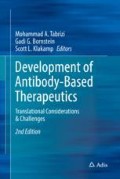Abstract
Antibody drug conjugates (ADCs) are increasingly employed as novel targeted therapies. Antibody drug conjugates combine the exquisite selectivity of targeted antibodies and the high potency of small-molecule drugs with the aim of achieving durable responses in patients. As application of highly potent small-molecule drugs can be limited by their undesirable toxicity, targeted delivery of highly potent small-molecule drugs to specific cells is intended at expanding the therapeutic window for the payload in the clinical setting. Critical parameters for design and selection of the antibody, target, and payload have been discussed in an earlier article (Sadekar et al., AAPS J 17: 828–36; 2015). Here, we have attempted to address some of the key translational topics critical for early development of this class of therapeutic. As anticipated, a successful transition of ADCs into the clinic will be highly dependent on effective translation of critical attributes governing exposure–response relationships across species.
Access this chapter
Tax calculation will be finalised at checkout
Purchases are for personal use only
References
Adair JR, Howard PW, Hartley JA, Williams DG, Chester KA. Antibody-drug conjugates: a perfect synergy. Expert Opin Biol Ther. 2012;12(9):1191–206.
Bauer RJ, Dedrick RL, White ML, Murray MJ, Garovo MR. Population pharmacokinetics and pharmacodynamics of the anti-CD11a antibody hu1124 in human subjects with psoriasis. J Pharmacokinet Biopharm. 1999;27(4):397–420.
Bornstein GG. Antibody drug conjugates: preclinical considerations. AAPS J. 2015;17(3):525–34.
Drachman JG, Senter PD. Antibody-drug conjugates: the chemistry behind empowering antibodies to fight cancer. Hematology. 2013;2013:306–10.
Henriksen L, Grandal MV, Knudsen SLJ, van Deurs B, Grøvdal LM. Internalization mechanisms of the epidermal growth factor receptor after activation with different ligands. PLoS One. 2013;8(3):e58148. https://doi.org/10.1371/journal.pone.0058148.
Heukers R, Vermeulen JF, Fereidouni F, Bader AN, Voortman J, Roovers RC, Gerritsen HC, van Bergen en Henegouwen PMP. Endocytosis of EGFR requires its kinase activity and N-terminal transmembrane dimerization motif. J Cell Sci. 2013;126:4900–12. https://doi.org/10.1242/jcs.128611.
Johns TG, Adams TE, Cochran JR, Hall NE, Hoyne PA, Olsen MJ, Kim Y-S, Rothacker J, Nice EC, Walker F, Ritter G, Jungbluth AA, Old LJ, Ward CW, Burgess AW, Wittrup KD, Scott AM. Identification of the epitope for the epidermal growth factor receptor-specific monoclonal antibody 806 reveals that it preferentially recognizes an untethered form of the receptor. J Biol Chem. 2004;279(29):30375–84.
Masson-Hinrichs MJ, Dixit R. Antibody drug conjugates: nonclinical safety considerations. AAPS J. 2015;17(5):1055–64. https://doi.org/10.1208/s12248-015-9790-0.
McCombs JR, Owen SC. Antibody drug conjugates: design and selection of linker, payload and conjugation chemistry. AAPS J. 2015;17(2):339–51. https://doi.org/10.1208/s12248-014-9710-8.
Modjtahedi H, Komurasaki T, Toyoda H, Dean C. Anti-EGFR monoclonal antibodies which act as EGF, TGFA, HB-EGF & BTC antagonists block the binding of epiregulin to EGFR-expressing tumours. Int J Cancer. 1998;75:310–6.
Panowski S, Bhakta S, Raab H, Polakis P, Junutula JR. Site-specific antibody drug conjugates for cancer therapy. MAbs. 2014;6(1):34–45.
Perera RM, Zoncuy R, Johns TG, Pypaert M, Lee F-T, Mellmany I, Oldz LJ, Toomrey DK, Scott AM. Internalization, intracellular trafficking, and biodistribution of monoclonal antibody 806-a novel anti-epidermal growth factor receptor antibody. Neoplasia. 2007;9(12):1099–110.
Perez HL, Cardarelli PM, Deshpande S, Gangwar S, Schroeder GM, Vite GD, Borzilleri RM. Antibody–drug conjugates: current status and future directions. Drug Discov Today. 2014;19(7):869–81.
Puddicombe SM, Wood L, Chamberlin SG, Davies DE. The interaction of an epidermal growth factor/transforming growth factor a tail chimera with the human epidermal growth factor receptor reveals unexpected complexities. J Biol Chem. 1996;271(48):30392–7.
Rhoden JJ, Dyas GL, Wroblewski VJ. A modeling and experimental investigation of the effects of antigen density, binding affinity, and antigen expression ratio on bispecific antibody binding to cell surface targets. J Biol Chem. 2016;291(21):11337–47.
Roepstorff K, Grandal MV, Henriksen L, Knudsen SJ, Lerdrup M, Grøvdal L, Willumsen BM, Deurs BV. Differential effects of EGFR ligands on endocytic sorting of the receptor. Traffic. 2009;10:1115–27.
Sadekar S, Figueroa I, Tabrizi M. Antibody drug conjugates: application of quantitative pharmacology in modality design and target selection. AAPS J. 2015;17(4):828–36. https://doi.org/10.1208/s12248-015-9766-0.
Shah DK, Haddish-Berhane N, Betts A. Bench to bedside translation of antibody drug conjugates using a multiscale mechanistic PK/PD model: a case study with brentuximab-vedotin. J Pharmacokinet Pharmacodyn. 2012;39:643–59. https://doi.org/10.1007/s10928-012-9276-y.
Sievers EL, Senter PD. Antibody-drug conjugates in cancer therapy. Annu Rev Med. 2013;64:15–29.
Tabrizi MA, Funelas C. Application of quantitative pharmacology in development of therapeutic monoclonal antibodies. AAPS J. 2010;12(4):592–601.
Tabrizi MA, Bornstein GG, Klakamp SL, Drake A, Knight R, Roskos L. Translational strategies for development of monoclonal antibodies from discovery to the clinic. Drug Discov Today. 2009;14(5–6):298–305.
Tabrizi MA, Bornstein GG, Klakamp SL. Development of antibody-based therapeutics: translational considerations. New York: Springer; 2012.
Author information
Authors and Affiliations
Corresponding author
Editor information
Editors and Affiliations
Rights and permissions
Copyright information
© 2018 Springer Nature Singapore Pte Ltd.
About this chapter
Cite this chapter
Tabrizi, M.A., Figueroa, I., Blumenschein, W., Grein, J. (2018). Antibody Drug Conjugates: Translational Considerations. In: Tabrizi, M., Bornstein, G., Klakamp, S. (eds) Development of Antibody-Based Therapeutics. Adis, Singapore. https://doi.org/10.1007/978-981-13-0496-5_10
Download citation
DOI: https://doi.org/10.1007/978-981-13-0496-5_10
Published:
Publisher Name: Adis, Singapore
Print ISBN: 978-981-13-0495-8
Online ISBN: 978-981-13-0496-5
eBook Packages: MedicineMedicine (R0)

